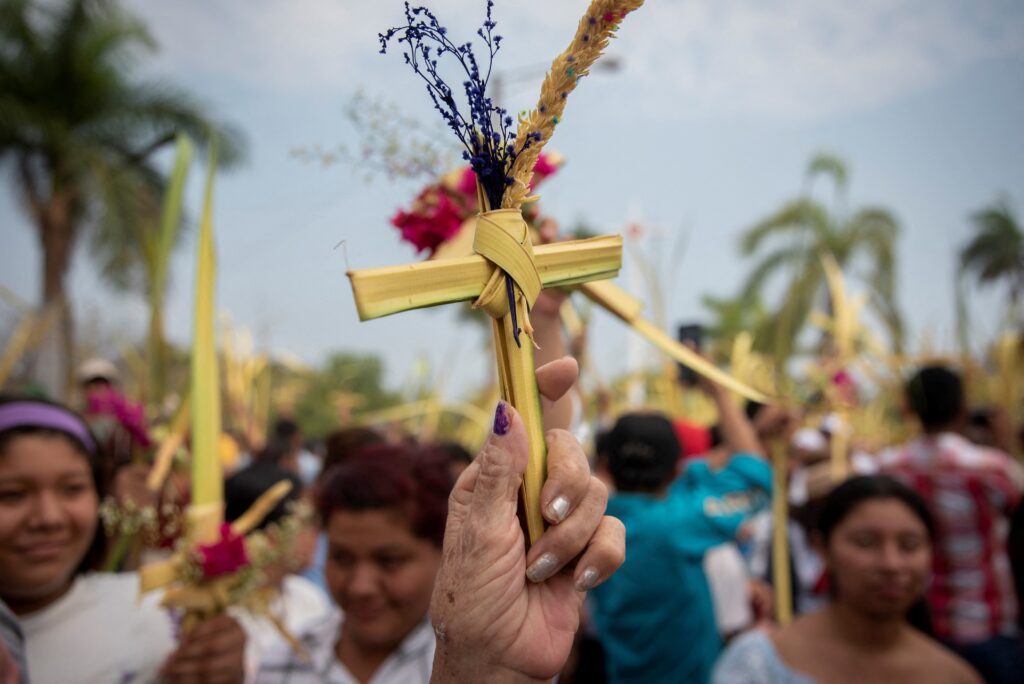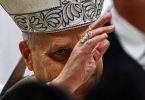
by Junno Arocho Esteves, OSV News
(OSV News) — For Latin American Catholics, December is an important month, not just in anticipation of the Christmas celebrations, but also for important Marian feast days, such as Our Lady of Guadalupe and the Immaculate Conception, that remain linked to their cultural history.
In Nicaragua, however, the days of public celebrations, processions and outward expressions of faith are fast becoming a distant memory, as the Sandinista regime of President Daniel Ortega continues its brutal persecution of the Catholic Church.
Ortega’s crackdown on the Catholic Church began in April 2018, after deadly protests against his government’s proposed reforms which led to calls for his ouster. Hundreds were killed in repressions by police and paramilitaries while demonstrators fleeing the violence sought refuge in churches.
Despite criticism of the overhaul coming from business leaders, university students and elderly pensioners, the president publicly blamed right-wing groups and the Catholic Church for inciting violence.
According to The Associated Press, Ortega, who rules the country with his wife, Vice President Rosario Murillo, accused the church of plotting a coup and labeled the country’s priests as “terrorists.”
Since then, the regime’s suppression of the church has only increased in its ferocity, with 2024 being a constant spin of persecution, with the arrest or expulsion of Catholic bishops, clergy, religious and lay men and women, and the shuttering of Catholic humanitarian organizations.
In January, Vatican News confirmed that Bishop Rolando Álvarez of Matagalpa, Bishop Isidoro Mora of Siuna and over a dozen priests were released after the Nicaraguan government reached an agreement with the Vatican to negotiate their release and exile.
An outspoken critic of the Ortega regime, Bishop Álvarez was arrested in August 2022 during a raid on his diocesan curia office and held in custody for more than 500 days. He was charged with conspiracy and spreading false information and sentenced to 26 years in prison.
Prior to his release, the United States Commission on International Religious Freedom, or USCIRF, condemned the Nicaraguan government’s arrest and imprisonment of Bishop Álvarez, as well as its detainment of priests and bishops who publicly criticized the government or expressed support for the imprisoned bishop.
The commission continues to monitor the situation in Nicaragua, and for USCIRF Commissioner Maureen Ferguson, the increasing attacks not only against the Catholic Church but other Christian denominations, including the evangelical and Moravian churches, is alarming.
In March 2024, authorities convicted 13 members, including 11 pastors, belonging to Mountain Gateway, a Texas-based Christian organization focused on evangelism, primarily in Nicaragua.
The group was found guilty of money laundering and organized crime in a sham trial and sentenced to up to 15 years in prison. However, after significant diplomatic pressure, U.S. Secretary of State Antony J. Blinken announced Sept. 5 that the United States secured the release of 135 political prisoners, including the members of Mountain Gateway.
“I think the trajectory has worried me the most because this has grown into a full-scale crackdown on the rights of the people of Nicaragua to practice their faith,” Ferguson told OSV News Dec. 9.
“We know this is a largely Catholic country and we know that their faith is precious to them, and it is imbued in the culture so deeply and so beautifully,” she added.
The Ortega regime increased its attacks against the church in April when it prohibited public exhibitions of faith, especially processions during Holy Week.
Ferguson told OSV News that the Ortega regime has continued to suppress public processions, which “are now replaced with sort of a secular carnival.”
Furthermore, she noted, girls and young women are suffering the consequences of the repression as they are often exploited at those government-sanctioned carnivals.
“Girls used to be brought up in the beauty of looking up to the Virgin of the Immaculate Conception,” Ferguson said. “Now, it’s a whole different story with these sort of secular carnivals” that have replaced Marian processions, including the feasts of Our Lady of Fatima and Our Lady of the Rosary.
“The chilling effect on the expression of faith is in itself shocking really. So, I would say what’s most concerning to me is the trajectory; that it’s only growing into more and more of a full blown crisis,” she said.
Over the summer, Nicaraguan authorities also targeted over a dozen Catholic media outlets in the country for closure, including Radio Maria, further limiting Catholics unable to attend Mass after priests were arrested, forced into exile or fled the country.
Religious congregations and nongovernmental organizations, as well as Catholic schools and universities, also had their legal status revoked and forced to shutter operations in the country, including the Missionaries of Charity.
Like the banning of religious processions, the expulsion of the Missionaries of Charity was also detrimental for young girls, Ferguson told OSV News.
The sisters “ran a home for teenage girls. They took in girls off the street who were being exploited” and “they cared for these girls. With them gone, who’s caring for the girls? Nobody! They’re being exploited again,” she said.
Elderly people and the poor, also cared for by the Missionaries of Charity, have also been left on the wayside after the sisters were expelled.
In August, the Ortega regime also revoked the legal status of Caritas, the Catholic Church’s charitable arm, in the Diocese of Matagalpa, the diocese of the now-exiled Bishop Álvarez. That same month, it revoked the legal status of religious orders, including the Franciscans, the Augustinians and the Carmelites, as well as lay Catholic groups in the country.
“Who’s caring for the elderly, the poor? Not the government! You have these beautiful, saintly nuns caring for them and they’ve been exiled and kicked out. So, the people of Nicaragua are suffering on a material level, from lack of care on a human level, from lack of care on a spiritual level, for having the expression of their faith suppressed. It’s just tragic on every level,” Ferguson said.
In November, the regime expelled another bishop: Bishop Carlos Enrique Herrera of Jinotega, president of the Nicaraguan bishops’ conference.
Bishop Herrera was forced to leave the country after he accused a local Sandinista mayor of sacrilege for blaring loud music outside of the cathedral while he was praying during a Nov. 10 Mass.
“We ask the Lord’s forgiveness for our faults and also for those who do not respect worship and truth,” as “this is a sacrilege that the mayor and the municipal authorities are committing. . . Go tell them because they know the time of the Mass,” he said during the Mass which was broadcast on the diocesan Facebook page.
Faced with the continued persecution of the Catholic Church and the exile of over 200 religious leaders and clergy members, as well as four bishops, Pope Francis addressed Nicaraguans in a letter released Dec. 2 by the Vatican.
Avoiding any direct criticism of the Ortega regime or the persecution of Catholics in the country, the pope called on Nicaraguans to not lose hope and to “be certain that faith and hope work miracles.”
Ferguson said that while there are some who hope to hear more from Pope Francis on the suffering of the Nicaraguan people, she thought the pope’s letter was “very beautiful” and believed that “people found it very heartening.”
While the Ortega regime continues to show no signs of ending his persecution, Ferguson told OSV News she was hopeful that significant pressure, especially from the United States, will help those suffering in the country.
“We have seen the regime respond to pressure with the example of the Mount Gateway pastors,” she said, expressing her hope that in the coming year, the new administration will continue to show “effective leadership on this issue.”
The commission, she added, will continue to push for a “muscular response from our government” and “to do more in the way of imposing targeted sanctions, visa bans on Nicaraguan government officials and agencies; on the people responsible for these attacks on houses of worship.”
“At the commission, we just continue to try to shine a spotlight on this and advocate for a more robust government response,” Ferguson said.






